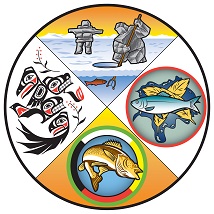About

Fish-WIKS research looks at understanding western and indigenous knowledge systems and explores how the different processes by which knowledge is acquired, transmitted and used can be harnessed to enhance Canadian fisheries policy. Funded by the Social Sciences and Humanities Research Council (SSHRC), the research aims to identify the commonalities and differences in indigenous knowledge systems across the Pacific, Arctic, Inland and Atlantic regions and in four distinct coastal communities in Canada (Tla-o-qui-aht, British Columbia; Naujaat, Nunavut; Nipissing, Ontario; and Eskasoni, Nova Scotia). The project also seeks to understand how indigenous and western knowledge systems can be used to improve the sustainability of Canadian fisheries.
Fish-WIKS Research Goals
- Examine how knowledge is valued, shared and used in both indigenous and non-indigenous knowledge systems
- Identify possible commonalities and differences
- Use the knowledge acquired to enhance decision-making afecting Canada's fishery resources for current and future generations
Key Activities
- Engage in community-identified priority setting
- Conduct, analyze and interpret desktop and field research related to fisheries decision-making
- Build awareness at each participating community site of Fish-WIKS and its goal of enhancing fisheries sustainability
- Recommend opportunities to enhance fisheries governance and management through shared knowledge
Key Outcomes
- Building long-term partnerships and mutual capacity based on trust and respect
- Indetifying and using the best model or mix of models from western and indigenous knowledge systems to influence fisheries-related decision-making within a regional and national context
- Training and mentoring of 18 undergraduate, Master's, doctoral and post-doctoral candidates with priority to indigenous students
- Anexpanding network of fisheries governance scholars and practitioners across Canada
- Shared policy-relevant knowledge using oral and written communication formats
- Enhanced fisheries sustainability through effective governance
